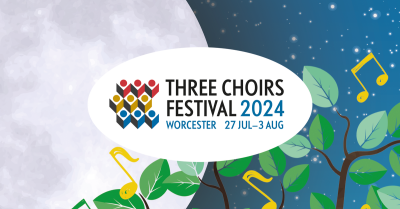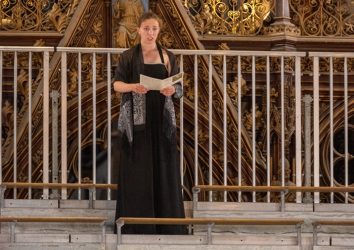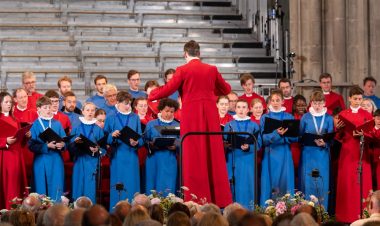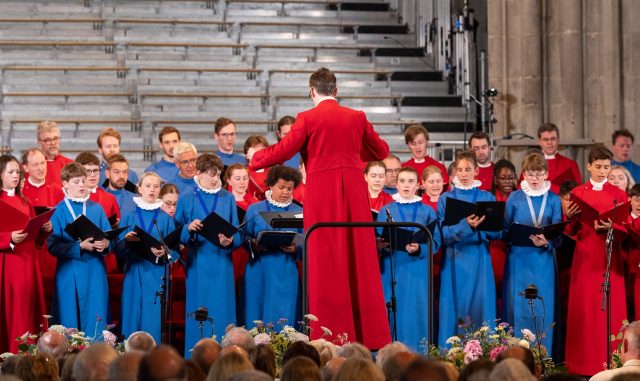
 United Kingdom Three Choirs Festival [5] – Whitacre, Stanford, Mealor, Chilcott: Florence Price (soprano), Three Cathedral Choirs / Samuel Hudson (conductor). Worcester Cathedral, 1.8.2024. (JQ)
United Kingdom Three Choirs Festival [5] – Whitacre, Stanford, Mealor, Chilcott: Florence Price (soprano), Three Cathedral Choirs / Samuel Hudson (conductor). Worcester Cathedral, 1.8.2024. (JQ)

Eric Whitacre – Lux aurumque
Stanford – The Bluebird (from Op.119)
Paul Mealor – Ringed with the Azure World (Four Madrigals on Birds) (Festival commission, premiere)
Stanford – Three Motets, Op.38
Bob Chilcott – The Angry Planet. An Environmental Cantata (2012)
Each year, the Three Cathedral Choirs unite to perform a major concert at the Three Choirs Festival. This year, under the direction of Samuel Hudson, they offered an evening of a cappella works, most of which fitted in with the concept of the natural world, which is a key theme at the Festival this year.
They began with Eric Whitacre’s Lux aurumque. This, I thought, offered an early and excellent example of the way the combined choirs – some sixty voices in all – blended. Whitacre’s music was very well sung and Hudson shaped the piece well. Stanford’s exquisite part song, The Bluebird (1910) has a vital top soprano line; tonight, this was delivered by local singer Florence Price. She is a former chorister at Worcester Cathedral and I learned from the programme biography that she has been offered a place to read music with a choral scholarship at Trinity College, Cambridge. It will be a wonderful experience for her to sing with that fine choir and on the evidence of what we heard tonight, I am not surprised Trinity College want her. She sang her part in the Stanford with pure tone and clarity. She was positioned right at the top of the choir staging and when she was singing the melody line in verse 1, I wondered if it might have been a better idea if Hudson had placed her a few rows further down on the staging; she would still have been above the choir but her lovely sound might have carried even better down the nave. This was a fine performance by all concerned of Stanford’s miniature masterpiece.
Next came the premiere of a Festival commission: Ringed with the Azure World (Four Madrigals on Birds) by Paul Mealor, who was present for the performance. Mealor has selected four poems with avian themes. First comes ‘The Eagle’ by Tennyson. Here, Mealor’s slow, dark-hued music evokes very successfully the brooding presence of the raptor as he surveys the sea below, locates his prey and strikes. The next poem is the anonymous ‘The Silver Swan’. Again, the music is dark and slow, which is not inappropriate since the poet is describing a mute swan. When the bird finally finds its voice the trebles carol while the lower voices continue with their dark, chordal music. ‘The Nightingale’ is another anonymous text. Mealor sets this to swift, nimble music. A feature of the setting is cheeky little interpolations from a cuckoo; the one at the very end of the piece provoked audible chuckles from the audience. The concluding ‘The Blue Bird’ uses the same poem by Mary Elizabeth Coleridge which Stanford set; it was fascinating to compare and contrast the approaches of the two composers. Mealor’s response to the poem is rather solemn and dark in colouration. In its own way it is impressive but I can’t help but wonder if it was Stanford who caught Coleridge’s mood better; I missed light and airiness in Mealor’s music. I liked much about Ringed with the Azure World, which seems to be well written for voices. If I have a criticism, it would be that three of the four settings have music which is predominantly slow and rather dark-hued. I am sure the composer will have been delighted by the assured first performance which Hudson and his combined choir gave.

To close the first half, we returned to Stanford. His Three Motets may not be the most obvious ‘fit’ with the theme of the natural world but it is always welcome to hear these splendid pieces, whether individually or, as tonight, as a set. These motets are much earlier than The Bluebird; in his programme note, Jeremy Dibble told us that they probably date from the late 1880s. These pieces are meat and drink to cathedral choirs and I got that sense from the performance tonight. ‘Justorum animae’ flowed nicely, though there was appropriate strength in the singing of the motet’s middle section. The Ascension motet ‘Cœlos ascendit hodie’ is a jubilant piece and I admired the excellent attack in the choir’s singing. Finally came my personal favourite, ‘Beati quorum via’. This is a gem of a piece and I really enjoyed its performance in which all the different vocal parts registered well; the ensemble was really well balanced by Hudson.
After the interval came a single work, Bob Chilcott’s The Angry Planet. This was commissioned by the Bach Choir; it was first performed at the 2012 BBC Proms. Subsequently, in 2015, a studio recording was made, which was my introduction to the score. The idea, including the title and the involvement of young singers, was David Hill’s. He proposed, in Chilcott’s words, a piece ‘on the subject of the fragility of our world and on our need to respect and care for our environment.’ This composition, lasting some 45 minutes, for unaccompanied choirs, is the result. For his libretto, Chilcott turned to his friend and frequent collaborator, the poet Charles Bennett.
The structure of The Angry Planet is concerned with a forest at night over a twelve-hour period, beginning at 6pm. The work’s four sections each relate to a three-hour segment of time, though there is no narrative of time passing; rather, what Bennett does in his poems is to stimulate the listener to observe and reflect upon the forest at various points in the night. Actually, we’re considering a threatened forest because the primary thrust of Bennett’s poems is the damage that man has done and may continue to do to the natural environment of the forest. This particular point is emphasised at several points in the score by the youth choir who ‘in an exaggerated spoken style’, as Chilcott describes it, enunciate the names of various animal species which are either at risk of extinction or which have passed the point of no return. For this performance, a small group of choristers (junior choristers, I think) acted as the youth choir. There were nine of these singers and every time they were involved, they came onstage and stood in line in front of the rest of the choir. They delivered their parts clearly, confidently and from memory. It never ceases to amaze me that young singers like these so often take part in complex choral works singing from memory (whereas all us adult singers use a score). It is not so much the fact that they can commit the words and music to memory but, even more impressively, entries and note values are spot on. That, I am sure, was the case tonight and these nine young musicians did a first-class job.
Chilcott set 13 poems in The Angry Planet. The music is varied and, I think, fits well with the words. Those who know his music through his mellifluous Christmas pieces may be surprised by the greater darkness and grit in this music but I think that’s entirely appropriate to the subject matter. He divides the main choir (in other words, all the singers apart from the youth choir) into three different groups and uses one or more group for each poem; at times the full ensemble comes together. That is a good decision because it produces variety of texture, something one appreciates even more when one can see the performance.
It struck me tonight that The Angry Planet is something of a slow burner. I had the impression that Parts 1 and 2, though important, seem to lay the ground for Part 3. The music acquires greater intensity in Part 3, and especially in third and fourth poems in that section. ‘3am’, the penultimate setting in Part 3, is a slow, sorrowful episode; it’s an increasingly intense elegy for the natural world. Significantly, the Latin words ‘Requiem æternam. Lux perpetua. Sempiternam requiem’ run like a vein throughout the setting, those words set to chant-like music. This is one of the most moving, memorable parts of the work. In the setting which follows, ‘Sorry too late’ Bennett weaves into his poem some words from the General Confession (Book of Common Prayer). Chilcott sets this particular poem to powerful, urgent music.
Earlier in the piece we had another opportunity to hear soloist Florence Price. In ‘Midnight’ she has the principal role – the supporting choral writing suggests, rather effectively, deep night. I thought she sang very well; her tone was clear and pure and she performed confidently. Her voice carried well to my seat halfway down the nave. Her contributions to this concert were completely assured.
The fourth and last section of The Angry Planet concludes with a poem entitled ‘Perhaps’, in which all the choirs join. Here, neither words nor music give us a ‘happy ending’; that would be facile and too easy. Maybe, though, Chilcott and Bennett conclude on a note of cautious optimism.
The Angry Planet received an assured and effective performance this evening; I am sure Bob Chilcott, who was present, was delighted. Unlike the Stanford Motets, this isn’t the sort of music – or subject matter – that cathedral choirs will often encounter. The lay clerks, who are professional singers, are more likely to do so but not, perhaps, the choristers. But, of course, young musicians are so adaptable.
When I first encountered the work on CD, back in 2015, I liked it (review here). The performance now left me a bit more thoughtful; I hasten to say that this in no way relates to the quality of what I heard. I wonder, however, if The Angry Planet is a bit too much of a good thing. It is quite lengthy – the performance took about 47 minutes – and that’s quite a long time for unaccompanied voices to sustain, though the Cathedral Choirs did so very well, never flagging in energy or technique. It crossed my mind that some instrumental colouring might have been welcome but, having said that, Chilcott’s skilful use of different choirs gives textural variety.
On reflection, I think the issue is that an awful lot of thoughts are addressed in this work. Though the two pieces are very different in style there is, I think, some similarity with Sarah Kirkland Snider’s Mass for the Endangered, which I heard earlier in the week (review here), in that the libretto is wordy and there is rather too much of it (though Bennett’s poems per se are very good and I much prefer them to the poems set in the Snider work). Perhaps setting one poem less in each section would have been beneficial. As we walked back to the car, I talked about what we had heard with my guest, a very experienced amateur singer. She agreed with me and used the word ‘congested’, by which she meant that there were too many words and ideas, leading to rather too much music. I think there’s a lot in that; there is too much packed into the score. That said, The Angry Planet and the performers were warmly applauded by the audience.
John Quinn
